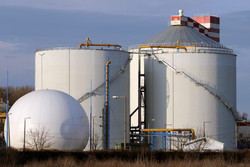Better control over anaerobic digesters
AD is an increasingly popular technique for recycling organic waste into usable biogas. However, the technique is limited by poor control (using pH and biogas composition), either resulting in process malfunctions or underutilising the reactor. The EU-funded AD-WISE(opens in new window) (Automated system based on on-line VFA sensors for an optimised control of anaerobic digestion plants) consortium addressed this problem by developing a new monitoring method. AD-WISE's solution uses volatile fatty acids profile (VFAP) as an accurate indicator of the state of the reactor. This method has the added bonus that its operators will be able to avoid malfunctions in the AD process using the VFAP. Researchers first built a prototype instrument that measures the VFAP using light. This allowed the VFAP monitor to be incorporated into a reactor for real-time monitoring. The next step was to build a working pilot reactor with this VFAP monitor incorporated. The consortium tested the reactor in a pilot plant as well as at an agro-industrial waste processing plant in Spain. AD-WISE will now look to commercialise its AD reactor technology, as well as use the technology in sectors beyond agriculture. In the long term, this system will promote AD as a viable waste reuse technology.







